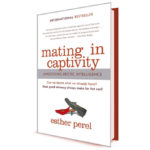
The following is the 4th installment of a hilarious ongoing series by author and squirrel hunter (seriously) Amy Bronwen Zemser called “How to Thaw Your Unborn Child,” about sperm donation and artificial insemination when you’ve got an acute case of lesbianism. Below, she writes about losing her first baby to its biological mother, Amy’s (ex)partner. Or you can start at the beginning here.
I loved that baby mightily. I carried her up and down the stairs in the laundry basket and I wore her in the front pack. I was there the first time she took a bottle, the first time she ate solid food, the first time she made a sound that sounded like a tune. I woke up with the baby at night and I carried her around in the morning. I was the Other Mother.
And yet, day in, day out, I lived with the insecurity of never being sure if the baby would really be mine.
At the time that Moira and I were together, when gay marriage was not yet legal, lesbians who had children together were in an unusual and ambiguous position when it came to the subject of parental rights. If you weren’t legally married to your same-sex partner, then having a baby together put the non-biological parent in the dangerous position of losing his or her child if the genetic parent wanted out of the dyad.*
*It’s funny to think that I could go out to a bar, have some wild night of god knows what with a man that I know about as well as a tomato, and wind up pregnant; the result of that night, a baby, would parentally bind us together under the law. Under most state laws, that strange man from the bar would have full paternal rights to a child that was unquestionably, redoubtably his (unless I were married to another man, which gets into a whole other ball of wax). But if a same-sex unmarried couple has a baby together, the non-biological parent must still go through the second-parent adoption process in order to become the legal parent to that child. Not every state offers same-sex second-parent adoption laws (Florida, for one), so you have to get married before you have kids in order to protect your parental rights if you are a non-biological parent. Or you have to live in a state where same-sex second parent adoption is legal (like NY). Anyway, this precarious circumstance for non-bio parents doesn’t exist for straight couples.
Moira and I fought relentlessly and ruthlessly. We went to a therapist. Two, actually. At the time I was working on a YA novel that took place in the Middle East, but truthfully, nothing held much meaning for me anymore. I worried incessantly about coming home to adore a baby that might not be mine.
I had a baby, but she might not be mine? Who does this? The circumstance was so absurd as to seem almost laughable. I would sit in the Brooklyn Writer’s Space on 5th and Garfield and cry quietly, so the other writers couldn’t hear. How could I let go of a baby? Every week that I continued to stay and wait for a decision to come down felt like judgement day.
We saw a therapist in the west village named Sandy Silverman. (And I strongly suggest you give Sandy Silverman a call if you have anything you need to work out, as she is very wise and observant. Sandy Silverman. Look her up.)
We used to bring the baby with us to the office. She would look up at me and smile toothlessly from her car seat, and I would cast her long and loving glances in which my heart melted and my chest tightened at the same time.
“That baby,” Sandy Silverman would say, shaking her head. “You and that baby have a connection.”
I went to my own therapy and I begged for Moira to get a therapist too — a good one. She wanted to see the one who received massages from her patients.
“That’s not a therapist,” I told her. “That’s a licensed practitioner with hideous boundaries. You can’t see that person, it’s not good therapy.”
“Well look at you making a unilateral decision about what therapist I should see,” Moira used to say.
My typical rant about therapy is that it’s different from other professions. In general, you can find other working professionals who perform far below any real standard of excellence, which isn’t too terrible, unless you are talking about a therapist, and then we are talking about something very terrible indeed. A bad therapist can seduce or dismiss or re-traumatize. Not that I have any experience with this.
I wanted Moira to see someone good. I wanted her to find someone competent who could fix us, who could repair our broken connection.
But the situation worsened with each passing month. As time went on I held on to my baby and my growing love for her; with each passing month I hated Moira more for doing this to me. I pressed and pushed for her to make a decision about our relationship, but she couldn’t. Often times I felt terrible for the way I treated her, too. I was angry all the time, so I wasn’t the sensitive, kind partner a woman needs when she has just had a baby. I felt threatened and helpless, Prufrock’s insect pinned and wriggling to the wall. I loved Moira and I wanted to stay. The threat to our family unit on the heels of my divorce (to a man) that I’d not yet processed (paperwork or otherwise) was more than I could bear. But the more I moved forward, the further she withdrew. I closed in; she retreated. Not exactly what you would call the picture of marital harmony.
A good friend in the journalism school at Columbia thought our story was compelling and did a radio interview with us. It was on the website for a few months, but eventually Moira asked my friend to take it down. She didn’t feel it was a generous portrayal of her side of the story.
Therapy sessions were brutally painful. I have a friend who once told me that couples therapy is only a tiny bit more painful than having your clothes ripped from your body and a meat hook driven into your back as heavy machinery drags your bloody carcass along the office carpet.
In our therapy sessions, Sandy, who had two children of her own with her partner, talked about how women have this idealized notion of child-bearing in which they think they will give birth to their baby, swaddle her in softest garments, and walk off into a blissful, fading sunset. Instead you get sleepless nights and daily exhaustion, coping with the various challenges of breastfeeding; or worse, coping with the challenges of breastfeeding while simultaneously trying to negotiate a relationship. I believe she was trying to explain this to Moira as a way of saying that having a new baby was enormously difficult and that this was okay, that you could power through this hard time and eventually come to a place of real love and reciprocity. We both longed for that happy ideal time that we thought was supposed to go down when you had a new baby.
“But you know,” Sandy Silverman would say. “I look at you, Moira, and I see fear. I see terror.”
Terror. Terror at the thought of sharing motherhood.
“You are intruding on my motherhood,” Moira said, in a session.
I’ll never forget that line as long as I live. Okay, maybe not as long as I live. In fact, I had forgotten all about it until just recently, ten years later in fact, when I phoned Sandy Silverman to ask if I could send some friends who were going through a breakup her way. We had a nice conversation and she reminded me of that line. Thank you Sandy Silverman for rehashing a heinous memory!
Still, it’s a telling comment, isn’t it? This idea of sharing motherhood, something specific only to lesbian couples with children. Here you have this idea of having a baby and becoming a mother, but there is this problem. There’s another mother. How are you going to navigate this? Is it different than having a father in the room? Surely men are at more of a remove. Maybe. Maybe not. I can’t be sure that there haven’t been mothers who have felt intruded upon by fathers, too. But then again, the babies are biologically theirs, and there is nothing at stake — no fear of loss, no holding up to the light, no potential extradition from parenthood.
Moira’s inability to extend parental rights to me, from my purview, seemed very peculiar. Why would anyone want to raise a child all alone? Why wouldn’t she have wanted financial support, emotional support, and most importantly, a second parent to help raise her child? Clearly I adored her. Moira said a lot of bad things about me, but she never once intimated that I wasn’t a loving parent to the baby.
She would lose doting grandparents, my father said. Then, after a pause, he speculated, “Maybe she just doesn’t love you anymore.”
I considered this possibility, but I didn’t believe it. Everything was fine until the moment I brought up the matter of the second-parent adoption. It was only after that point, after I continued to pressure her to make a decision, that the loving glances faded, the devotion withered. And if I didn’t pursue the matter, life felt normal again. If I didn’t question her parenting skills, everything was okay.
Maybe you should just wait, a friend of mine said. Don’t bother her. She’s postpartum. Eventually she will see that you are supposed to be the other legal parent. Don’t drive her crazy and it will happen.
I thought this was a good point, and I tried to imagine waiting, but I really couldn’t abide. I didn’t want to feel that I was being put to the test with a child as my reward for good behavior. It felt as though my life were on the rack, and I pressed Moira daily to get me off of it. I was unyielding and unrelenting and unflinching. I gave her no room to breath.
But I think I had a right to be terribly, irrevocably frightened. The idea of losing my child terrified me.
That baby. She was so adorable.
Here is what I believe to be true: if you want to have a functional and open relationship with someone else, you have to do the hard work of being together. You have to be wiling to wrangle. You must negotiate. You must come to grips with your uglier sides and admit that you were wrong and be in touch with that shitty thing your mother or your father said or did to you thirty years ago that you replay in all your relationships today. You have to wrestle that ugly thing to the floor and beat it on the head and probably eat it.
At this point you will have brought knowledge to the forefront of consciousness. You will have a shot at managing your relationship or raising a child with some degree of awareness. All right, you won’t be perfect. But you’ll be in touch with your stuff and you’ll know enough to not repeat bad things. Or in the least if you repeat them, you will know you are doing so. You will give them voice. Which is only fair to your partner and to your child.
You have to be able to talk about things that made you sad or scared or uncomfortable. You have to do hard work. You must be brave.
Moira could not do any of these things. She was not willing to do hard work, and she could not be brave.
The night I realized that the relationship was over was one of the worst revelations of my existence. Worse than figuring out I was a homosexual (actually, that was a really fun and HOT night, but that’s for another post). Worse than divorce, surgery, root canal procedures where the anesthesia doesn’t take effect, and throwing up on a hot subway platform in Times Square when you are 11 weeks pregnant with twins. During rush hour.
I write this to you now because there are others who have gone through this, because perhaps you are going through this right now, or perhaps someday one of you might. Everyone puts their own face on a breakup, but there’s no argument that the quality of the pain is universal. You’re losing a primary attachment. You’re a little kid and you’re losing your mom. Your dad. Your girlfriend and your wife and your husband all rolled into one big black ball of despair.
We were sitting on the sofa. I was saying something, I don’t remember what, and suddenly, in that moment as she picked up the remote control to turn on the television, it hit me. You don’t want to be with me. You don’t want to be with me, and you don’t want me here. I don’t know why it took so long, so many months, for this to register. She wasn’t strong enough to ask me to leave (in fact she cried and begged me to stay when I did leave) but she absolutely and categorically did not want me there. She couldn’t have me there. She couldn’t have the other mother.
I started crying. To the crying I added some sobbing and then finally for the big finish, I threw in a healthy dose of hyperventilation. Weird sounds came out of my head and I started to act like a crazy person who was addicted to morphine and going through methadone withdrawal. I think that’s a pharmaceutically impossible scenario but you understand.
In retrospect I must have been having some kind of panic attack. I managed to phone a therapist I used to see in California during my divorce and when I got her on the phone I tried to say something, but it came out all mangled, like I was drunk or maybe on speed after doing a couple hundred whippets. The California therapist told me to go to the emergency room. I hung up. I couldn’t see or hear or function but somewhere far away at the end of a long tunnel I could hear Moira on the telephone, and then, a few minutes later, one of my closest friends materialized. She lived down the street near Prospect Park, and I can only imagine what she thought of the crumpled mess of tears and snot pacing the tiny hallway, but there she was, my dear friend Laura. I could barely make out her shape. But she was there.
Everyone should have one of these friends, the ones who sit with you without proffering up cheap advice or useless platitudes. These are the friends who bring you something to eat when someone close to you dies. These are the friends who walk your dog or clean your bathroom. They steam brown rice and they make you tea. Laura whispered something to Moira for a few minutes while I tried hard to get my body to allow a little more oxygen in. Someone put on the kettle.
Laura put me in the shower.
When I came out I sat on the edge of the bathtub, and Laura took out a brush, and she combed my hair. (This is no small task, as I have an enormous amount of it. Think Amy Winehouse meets Roseanne Roseannadanna.)
Laura brushed my hair for ages. She untangled knots and parted thick, complicated strands. She dried each section with the towel, combed through other sections, and towel-dried some more. I don’t know how long this went on for, but eventually I stopped crying and just sat there in a semi-catatonic state. Laura kept at it until all my hair was combed through. She never said a word.
A few weeks later, I moved out. At first I saw Moira and the baby frequently, and then I saw her less, and then she started dating someone else, and then I started dating a bunch of someone else’s, and then I met Lynn. Moira and I talk on the phone once or twice a year. When Ray was born, she came over. When the twins were born, she sent me a gift. I haven’t seen her in a few years, and when I try to talk to her on the phone she talks constantly and can’t really listen. Could she ever?
She gets nervous and can’t sit still and can’t analytically linger on a conversation for any length of time. She has the neurotic energy of someone who doesn’t want to be pinned down for any conviction that might highlight emotional vulnerability.
Yet she is funny and warm-hearted and intelligent. As far as I know she is not in a relationship with anyone. I am certain that Abby does not have another legal parent.
I have 3 children now, two of whom are small twins, and I am busy having peanut butter smeared on my armpit at this very moment.
There was an article in the New York Times magazine a few months after I left Moira. It was about this lesbian couple that went through a terrible breakup. One mother donated eggs to her partner, and twins were born, and then the relationship ruptured. The gestational mother refused to allow her partner, the biological mother, access to the twins. It was a bitter, horrible lawsuit. Sandy Silverman sent a letter to the magazine:
As a psychotherapist who has worked with lesbian couples who are raising children, I read Peggy Orenstein’s heart-wrenching article (July 25) with great interest. Women grow up socialized to become the sole mother to their children. Unless lesbians who decide to have children together are able to accept the loss of this role as sole mother and to embrace the opportunity to create loving families with two women as full parents, each with unique and meaningful attachments to their children, they will face obstacles in forming cohesive families.
Sandra Silverman
New York
Sandy Silverman was happy to hear from me, ten years later, when we spoke on the telephone.
“That was a particularly tough thing you were going through,” she said. “It was such a hard time in your life. I don’t always get to hear from people after they leave. How have you been?”
“I’m fine,” I said. I looked over at Lynn, who was reading a book to Ray while the girls were pulling up old tiles in front of the fireplace.
“No, I’m terrific,” I said. “Just terrific.”

















.Amy, brilliant and amusing and honest and painful. Just the way I remember you.